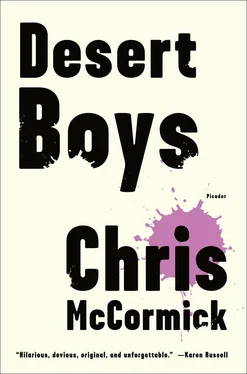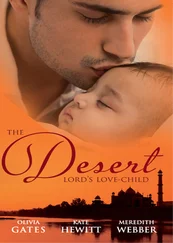Which is why — even though he’d grown tired of the sport a while ago, he’d begun to see it as a fetishization of war — when Watts asked him for another game of paintball in the desert, Kush agreed. Again they rode their bikes, just the two of them. On the ride out they didn’t speak, and the only sounds came from the gravel squirming under their tires. As they approached their spot in the desert, Kush and Watts realized they’d already played their last game.
All around them in the dirt were the chevron tracks of farm equipment. The trenches had been filled. The walls had been leveled. The plaid sofa, the mirror, the piles of tire shreds — all of it had been hauled off. In fact, the only evidence of its being the right place at all was the polychromatic paint freckling some of the Joshua trees. At the side of the road, a newly embedded realty sign swung in the wind.
“Well,” said Watts, turning his bike about-face. “Paintball had to end sometime.”
It was what had to be said, but Kush hated to hear it. He understood the end of paintball to be the evaporation of the final strings of glue holding him and his friends together. He said, “I have to get out of this place.”
Without aiming his gun, he took a quick shot at the realty sign.
* * *
Lloyd asked me to swing by the bookstore, said he had a gift. When I arrived, he hugged me and told me to stay put. Then he trotted off to the back of the store, out of sight. When he returned, he was wheeling behind him a purple carry-on bag. “I’m taking you up on your offer,” he said, beaming.
“I never offered to travel with you,” I said, honestly confused.
Lloyd laughed. “No, stupid. It’s my novel. I printed out a copy for you.”
“Oh,” I said, taking another look at the carry-on. “Oh my.”
“Printing it cost me, like, forty-five dollars.” Of this he seemed proud.
“Well, thanks,” I said, and took hold of the retractable handle. I wondered if he expected me to pay him back.
“Don’t worry about line-edits,” he said as I was leaving. “Just give me your gut reaction on the big-picture level.”
When I got home, I opened the bag and pried apart the manuscript to the last page, to see the page number—1423. I closed the manuscript, zipped the bag, and wheeled the luggage to the corner of my apartment, next to the DustBuster.
Not too long ago, I would’ve left the damn thing in the corner and rolled my eyes every time I happened to look over at it. In college I’d been surrounded by rich, comfortable kids who called themselves writers, and the prospect of getting into a relationship with the most flamboyant member of that self-assured bunch would’ve made me puke. But now I looked at that purple carry-on luggage, imagined the box of pages inside, and felt something like admiration. Someone else might’ve seen a carry-on with torn fabric and muddy wheels. But I looked at that bag in the corner and saw a man’s secrets — his ideas, his grievances, his memories, and his fantasies. I looked at that bag and fell a little bit in love.
* * *
Because of that “substantial pay increase” Karinger kept referring to about the marines, he and Jackie finalized arrangements for a small wedding to be held at the Connolly farm in April of senior year. Kush and Watts shared the title of best men.
Karinger’s mother helped with the preparations. In the lawn between the house and barn, she carried two fistfuls of poppies, which she’d picked in the fields northwest of town. “I know, I know — I’m a criminal,” she said, placing the orange state flowers here and there around the makeshift altar. The pine panels of the stable — the heads of two horses peering over — provided the backdrop.
A bald priest with an old man’s sense of humor had come out to the barn. At one point, he turned to the horses behind him and said, “If you object, say neigh.” The children and the parents encouraged him; the wedding parties rolled their eyes.
Beer and champagne were served to the adults — a label extended for the day to include the newlyweds — and soda and juice had been provided for the rest. Kush held a can of Coke at the serving table, and found himself in a conversation with Linda Karinger and the priest. The bride and groom were off chatting with the father of the bride, along with the aunts and uncles. Children alternately chased each other in the grass and petted the noses of the horses. Kush couldn’t spot Watts.
The priest asked if Kush aimed to join the marines, too.
“Oh,” said Kush, thinking of the antiwar articles he could recite. “No, not me.”
“This one is on his way to college,” said Linda lovingly.
“A word of advice,” said the priest. “Universities are good for the mind, but don’t let them train you to neglect God.”
Kush put down his Coke and said he had to use the restroom. Could they point him in the right direction?
Kush admired the land and the horses, but the house itself was relatively small and unspectacular. Quickly he found the hallway to the left, following his directions. Counting one, two, three doors on the right, he grabbed the doorknob.
“Occupied,” came a voice — the unmistakable, drowsy voice of his friend Watts.
“It is I,” Kush said.
Then came a moment of silence.
“Might be in here for a while,” Watts said.
“Take your time,” Kush said. “I don’t really have to use it. I’m just trying to get away from that priest for a bit.”
Another pause. This one lasted longer than the first. Kush would have to be the one to break the silence this time. With his fingertips he drummed on the door. “Are you feeling all right?”
“Shit,” said Watts, as if he’d just made a decision. “You have to promise me something. You promise?”
“What am I promising?”
“You have to promise not to mention what you’re about to see. Ever.”
“Did you have an accident?” Kush said, laughing.
“Will you just promise?”
“Sure,” Kush said. “I promise, I promise, I promise.”
The door shot open, hitting Kush in the shoulder. Out rushed Roxanne Karinger, fixing her dress on her way down the hall. Watts stayed in the bathroom, sitting on the toilet in his suit, buckling his belt. “Promise me again.”
* * *
Two hundred pages into his novel, I recognized a story I’d told Lloyd at the bar. Three teenaged boys (minor characters all of them, recently added to the book) sit on the hood of a car, talking. They’re parked at the beach (not the desert), but the conversation is, more or less, one I’d had with Karinger and Watts almost six years earlier.
The boy heading to the military tells the other two he doesn’t want to have a kid until after the wars are over. The boys have just graduated high school, and they’re still wearing their caps and gowns. Their thighs are pressed together on the car while they pass around a bottle of whiskey one of them has stolen from his parents’ liquor cabinet. The military kid doesn’t want to get killed — or worse — thus forcing his child to make up stories about him. He confesses that he himself has been making up stories about his own father — Willem — for years, namely that he saw combat. He hadn’t. In fact, Willem had been struck with testicular cancer, and remained Stateside for the entirety of Desert Storm. A few years later, Willem left his wife and kids, and was living, monotesticularly, someplace in Bakersfield.
I called Lloyd and told him to cut the scene. I didn’t care if the novel never got published, if I was the only person in the world who’d make it to page 212 to see it. I wanted Karinger’s story — and his father’s — out of the book.
“I’ll cut it, sure,” Lloyd said. “But, you know I didn’t mean to offend you. This is how the world works. People are just amalgamations of stories. When one person becomes close to another, all those combined stories merge and create new stories. It’s not appropriating so much as evolving. Do you see what I mean?”
Читать дальше












